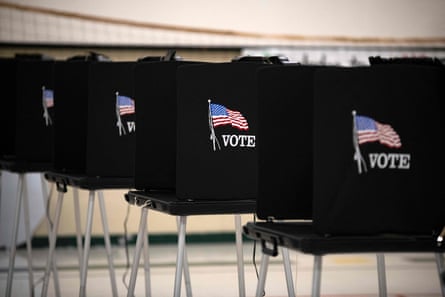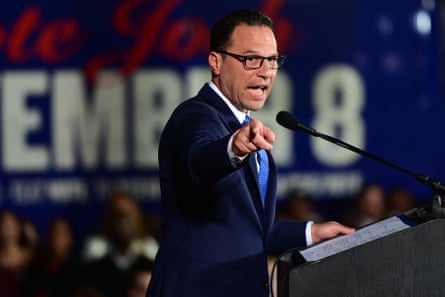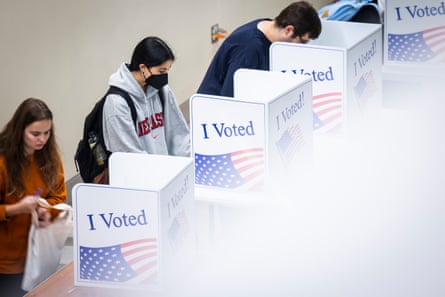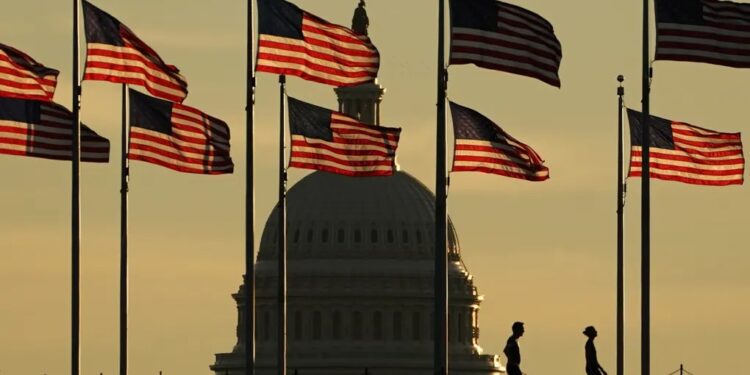What we know so far: several Senate races remained too close to call, but some key races were tilting toward Democrats
Democrats had a reason for cautious optimism on Tuesday night, as some of their endangered candidates appeared likely to emerge victorious in the midterm elections, but Republicans still enjoyed an advantage in the battle for control of the House of Representatives.
Americans headed to the polls on Tuesday to determine control of the US Congress for the next two years, and election forecasts had favored Republicans in the final days of campaigning. The president’s party typically loses seats in the midterms, and Joe Biden’s low approval rating, combined with concerns about the state of the US economy, had lowered Democrats’ expectations.
But some key races were tilting toward Democrats in the final hours of Tuesday night. Democrats won two of three House races in Virginia, tempering Republicans’ boasts of an election-day blowout. Jennifer Wexton and Abigail Spanberger fended off Republican challengers, though Elaine Luria – a member of the House select committee investigating the January 6 insurrection – conceded to her opponent, Republican Jen Kiggans.
With many races still too close to call, control of Congress – and the future of Biden’s agenda – hung in the balance. But the early results already returned one certainty: the election is not unfolding as Republicans had hoped.
“Definitely not a Republican wave, that’s for darn sure,” senator Lindsey Graham, a Republican from South Carolina, told MSNBC as results filtered in on Tuesday night.

Despite some glimmers of hope for Democrats, Republicans were still favored to regain control of the House, in part thanks to a favorable redistricting season following the 2020 census. The party has flipped at least three seats in Florida, where state legislators redrew the congressional map to give Republicans a significant advantage.
In the fight for the Senate, several races remained too close to call as Tuesday drew to a close. Georgia Senator Raphael Warnock was running neck and neck with Republican Herschel Walker, elevating the possibility of a runoff next month if neither candidate can capture 50% of the vote. JD Vance, The Trump-backed author of Hillbilly Elegy, defeated Democratic congressman Tim Ryan in an unexpectedly close contest for Ohio’s open Senate seat, while Republican Ted Budd beat back a spirited challenge from Democrat Cheri Beasley for an open Senate in North Carolina.

But the successes of Democratic senators Michael Bennet of Colorado and Maggie Hassan, who were considered endangered in the event of a Republican blowout, gave his party hopes of maintaining control of the upper chamber.
The Senate is currently split 50-50 with Democrats holding the tie-breaking vote, and there are several other toss-up races including in Pennsylvania, Nevada and Arizona.
The final results, which will determine control of Congress for the remainder of Biden’s first term as president and could further constrain his legislative agenda, may take days or even weeks in some closely fought Senate races. Delayed results are likely to fuel legal challenges and conspiracy theories about vote-rigging, particularly if the remaining seats determine control of the Senate.
Some battleground states saw hiccups at polling places on Tuesday, escalating fears that election deniers would use the isolated incidents to raise baseless doubts about the legitimacy of the results:
- In Arizona’s Maricopa county, officials said they had resolved a tabulator issue that had caused delays at some polling places. A judge denied an emergency motion filed by Republican groups to extend voting hours, as county officials assured the public that all ballots would be counted.
- One community centre in Georgia’s Cobb county announced it would stay open an additional 45 minutes after a delayed start on Tuesday morning.
- Some polling sites in Pennsylvania’s Luzerne county ran out of paper, resulting in some voters being turned away. A court ruled that the Republican-leaning county should stay open until 10 pm ET to ensure voters had enough time to cast their ballots.
That ruling could impact Pennsylvania’s hotly contested Senate race between Mehmet Oz, a Trump-backed Republican, and Democrat John Fetterman, who has been battling to assure voters he is fit for office after suffering a stroke. Earlier on election day, the agency overseeing the voting in Philadelphia said it will delay counting thousands of paper ballots because of a Republican lawsuit that said the process was open to duplicate voting.
Dozens of Republican candidates for the Senate, the House of Representatives and other major offices have refused to confirm that they will accept the result if they lose amid a swirl of false claims of fraud, stemming from Trump’s assertion that the 2020 presidential election was stolen from him and kept alive by the Republican party leadership.
Thirty-five Senate seats and all 435 House of Representatives seats are on the ballot, giving Republicans an opportunity to drastically change the makeup of Congress. Opinion polls had suggested that support for Democrats has fallen in recent weeks amid growing voter concern about high inflation and crime, two issues on which Republicans are seen as stronger.
According to AP VoteCast, half of the voters say inflation factored significantly in their midterm decisions, a potentially ominous sign for Democratic prospects. But in more encouraging news for Democrats, a similarly large share of voters – 44% – said their primary concern was the future of democracy, which is a theme that Biden and his fellow party members have emphasized in their final days of campaigning.
The president has said that American democracy is on the line in the midterms in the face of numerous challenges, from gerrymandering and voter suppression to Trump’s false claims about vote-rigging.

“Our lifetimes are going to be shaped by what happens the next year to three years,” Biden said at a final campaign rally in Maryland on Monday. “It’s going to shape what the next couple of decades look like.”
Many Democratic candidates have also focused strongly on protecting abortion rights in the wake of the US supreme court’s reversal of Roe v Wade earlier this year.
The outcome of state elections for governors and judges was expected to have important implications for abortion access in several states.
In Pennsylvania, Democrat Josh Shapiro decisively defeated Republican Doug Mastriano, a far-right election denier who was central in the effort to overturn Biden’s 2020 victory in the state. The stakes were high in the presidential battleground state, where the governor appoints the secretary of state. In Michigan, governor Gretchen Whitmer declared victory over her Republican challenger, Tudor Dixon, an anti-choice Trump loyalist, in a race that centered on abortion access.
Meanwhile, in Florida, Republican governor Ron DeSantis cruised to victory, amid mounting speculation about his 2024 presidential ambitions. His wide margin of victory included a vote from the former president, a resident of Florida who has sharpened his criticism against DeSantis as he prepares to launch another White House bid.
In Georgia, Stacey Abrams, a Democratic star, conceded to governor Brian Kemp, concluding a bitter rematch of their 2018 showdown. Another Democratic hopeful, Beto O’Rourke, fell short in his effort to unseat Texas’s governor, Greg Abbott, who soundly won a third term.
Two gubernatorial races provided reason for optimism among Democrats. The party flipped seats in Massachusetts and Maryland, Democratic strongholds with a history of electing Republicans statewide. Democrats’ candidates in those states will make history, as Wes Moore will become Maryland’s first Black governor and Maura Healey will be the first openly lesbian governor in American history.

In New York, governor Kathy Hochul easily defeated a challenger from Republican congressman Lee Zeldin, who hoped to pull off an upset in the liberal state by tapping into voters’ concern over crime. Hochul, who ascended to the role after the resignation of Andrew Cuomo, became the first woman elected governor in New York’s history.
In Vermont, Democrat Becca Balint became the first woman and first openly gay person to represent the state in Congress, while Republican Sarah Huckabee Sanders, Trump’s second press secretary, was elected as the first female governor of Arkansas. And in Florida, the 25-year-old Democrat, Max Frost, became the first GenZer elected to Congress.
Anger at the supreme court decision appeared to drive many people to the polls who might not normally vote in the midterms, particularly women.
In Michigan, voters appeared on track to protect abortion access, while voters in Vermont and California elected to guarantee the right to abortion in their constitutions. Meanwhile, in Maryland, voters overwhelmingly approved legalizing cannabis.
If the Republicans take control of the House they have threatened to launch a series of investigations into Biden and his administration in an attempt to embarrass him in the run-up to the next presidential election.
Source: The Guardian




Recent Comments